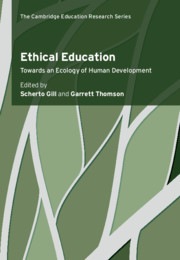
-
Select format
-
- Publisher:
- Cambridge University Press
- Publication date:
- June 2020
- July 2020
- ISBN:
- 9781108769778
- 9781108477406
- 9781108708654
- Dimensions:
- (244 x 170 mm)
- Weight & Pages:
- 0.54kg, 210 Pages
- Dimensions:
- (244 x 170 mm)
- Weight & Pages:
- 0.37kg, 208 Pages
- Subjects:
- Teacher training and professional development, Ethics, Education, Education, History, Theory, Philosophy
- Series:
- Cambridge Education Research
You may already have access via personal or institutional login- Subjects:
- Teacher training and professional development, Ethics, Education, Education, History, Theory, Philosophy
- Series:
- Cambridge Education Research
Book description
Ethical education should help students become more sensitive to the perspectives and experiences of others. However, the field is dominated by the teaching of moral values as a subject-matter, or by the fostering of character traits in students, or by moral reasoning. This book proposes an alternative to these limited moralistic approaches. It places human relationships at the core of ethical education, in its understanding of both ethics and education. With contributions from renowned international scholars, this approach is laid out in three parts. Part I develops the underlying theory of ethics and education; Part II focuses on the relevant pedagogical principles, and Part III provides illustrations of emergent innovative ethical educational practices in worldwide schools. Against a backdrop of divisiveness and apathy, the innovative practices described in this book show how a new vision for ethical education might be centred around caring for students' well-being.
Reviews
'A hugely important and timely book, Ethical Education, not only exposes and challenges the widespread contemporary betrayal of education, it also offers inspiring alternatives that return us to the enabling conditions and lived practicalities of human flourishing. The elegance and depth of its intellectual analysis is matched by the richness and range of its grounded cases studies. A must-read for all who wish to deepen their understanding of our present malaise and work for life-affirming, truly educational alternatives.'Michael Fielding, Emeritus Professor of Education, University College London
Contents
Metrics
Full text views
Full text views help Loading metrics...
Loading metrics...
* Views captured on Cambridge Core between #date#. This data will be updated every 24 hours.
Usage data cannot currently be displayed.
Accessibility standard: Unknown
Why this information is here
This section outlines the accessibility features of this content - including support for screen readers, full keyboard navigation and high-contrast display options. This may not be relevant for you.
Accessibility Information
Accessibility compliance for the PDF of this book is currently unknown and may be updated in the future.


